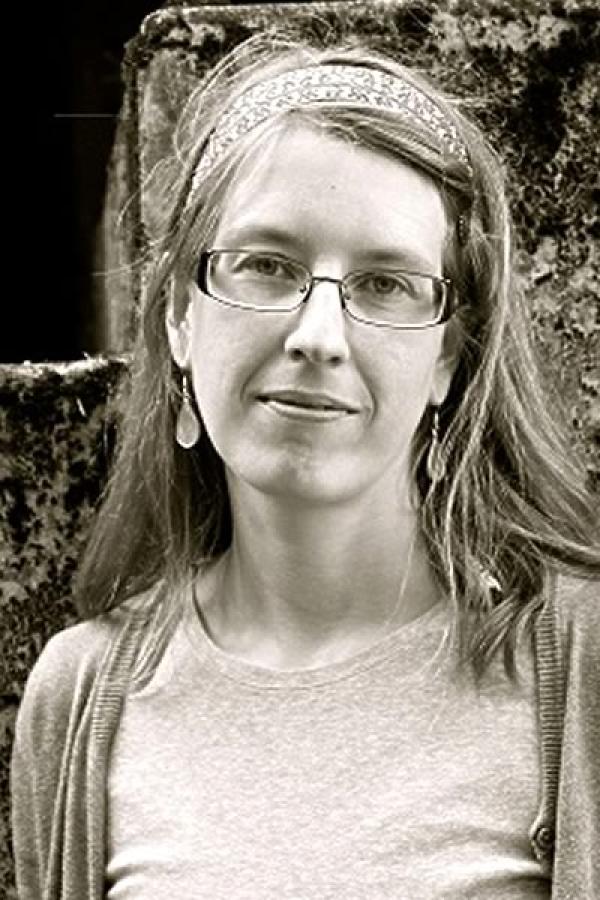Kathryn Nuernberger

Photo by Maya Jewell Zeller
Bio
Kathryn Nuernberger is the author of two poetry collections, The End of Pink (BOA 2016), which won the James Laughlin Award from the Academy of American Poets, and Rag & Bone (Elixir 2011), which won the Antivenom Prize. Her collection of lyric essays, Brief Interviews with the Romantic Past won Non/Fiction Prize from The Journal and is forthcoming from Ohio State University Press. Recent work appears in 32 Poems, The Collagist, Crazyhorse, Field,The Journal, West Branch, and Willow Springs. She has received fellowships from the American Antiquarian Society and the Bakken Museum of Electricity in Life. She is an associate professor of creative writing at University of Central Missouri, where she also serves as the director of Pleiades Press.
Author's Statement
This NEA grant will help provide time and resources necessary to work on a new poetry manuscript, Rue, which combines historico-botanical research on plants traditionally used for birth control with post-confessional lyrical mediations on the complexities of love and family. So many of my poems collage formal academic inquires with the intimacies of one’s most inner life. To that end, field research and expeditions in search of archival ephemera are an important part of my writing processes – this grant will help support an expedition or two in pursuit of some elusive plants and other growing things, as well as a season of adventures in medieval gardening and nineteenth-century elixir brewing.
And, of course, what a gift it is to take a breath and focus on the poems, instead of fretting over that endless hustle to pay the babysitter, the baker, the banker, and the lady up the road who makes that delicious farmer’s cheese.
For me, though, the most significant benefit of this award is the encouragement and affirmation that comes from being included on a decades-long list of writers whose works have been my most potent sources of inspiration and nourishment.
"It’s Like She Loves Us and Like She Hates Us"
Our whole guise is like giving a sign to the world to think of us in a certain way but there’s a point between what you want people to know about you and what you can’t help people knowing about you. —Diane Arbus
Sometimes I feel like that Diane Arbus portrait
of a cross-dressing woman with curlers in her hair
and a cigarette in her well-manicured hand staring
too long at the camera. Sometimes I feel like
every character I meet is an allegory of myself.
John fell from a ladder in his barn and broke
his lawn mower with his body but wasn’t hurt
himself at all. It was so astonishing he’s already
posted about it on Facebook three times. Reading
between the lines, you can tell he’s worried
maybe he actually died in that fall after all.
So I mess with him in the comments and say
something to that effect. He wonders if
there’s a German word for this feeling. I tell him
there’s a German exchange student crashing
at my house right now playing Hot Lava
with my kid. And they call it lava in German too.
The German short “a” is so much like ours
it may as well be the same word. I’m worried
that John is really dead and the rest of us with him,
because there’s no word for this feeling –
not even in German – and that’s how you know.
I’ve been writing lecture notes this morning,
summarizing Plato’s Cave for nineteen-year-olds
who will no doubt conclude getting a little high
is the way out. I assume this because that’s what I did.
I have to remind myself I am not everybody.
Everybody in the cave is chained and suffering.
I have an animation to show them that retells the story
in clay, like a Gumby episode, except every still
frame echoes that government report on torture
released last month that is just one more example
of our denials as a society and complicity as a nation,
bolstered by the fact the photographic evidence
was censored and only later released through leaks.
I’ve read torturers come to like their work and any of us
could, because we don’t have a way to understand
another person’s pain and we really want to understand
each other. My notes also include Susan Sontag,
who said fifty years ago in her essay on Plato
and photography, “Enough with the pictures already.”
She was thinking of Dachau and thinking of Arbus.
The pictures, she said, feel like they’re breaking
something inside ourselves we might have liked to keep.
I’d like to remember what picture I was looking at
when I was sober enough to realize there is no light
but this light. Maybe I just looked out the window,
as I did this morning, and saw my neighbor on his
mower, smoothing his lawn into that grassy plane
he likes so well. I felt a little closer to him, like he’s
one of those portraits Sontag was talking about,
his face so hardened it’s repelling at first, which is
why Sontag derides them so forcefully. I’ve found,
though, if you make yourself hold on, the faces
Diane Arbus made turn so vulnerably human
you start to fall in love a little with this relentlessness
of people. Even the ones that are pathetic. Even
the ones that are pitiable. Even the ones that repulse
and terrify for how much they look like you. John,
I think being dead suits me.

